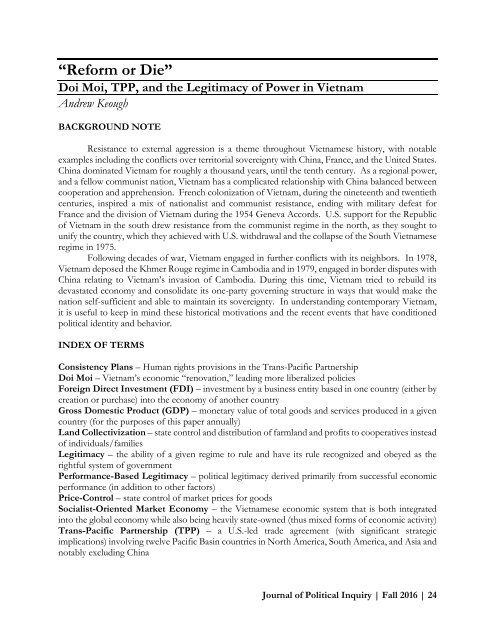Fall2016_Final
You also want an ePaper? Increase the reach of your titles
YUMPU automatically turns print PDFs into web optimized ePapers that Google loves.
“Reform or Die”<br />
Doi Moi, TPP, and the Legitimacy of Power in Vietnam<br />
Andrew Keough<br />
BACKGROUND NOTE<br />
Resistance to external aggression is a theme throughout Vietnamese history, with notable<br />
examples including the conflicts over territorial sovereignty with China, France, and the United States.<br />
China dominated Vietnam for roughly a thousand years, until the tenth century. As a regional power,<br />
and a fellow communist nation, Vietnam has a complicated relationship with China balanced between<br />
cooperation and apprehension. French colonization of Vietnam, during the nineteenth and twentieth<br />
centuries, inspired a mix of nationalist and communist resistance, ending with military defeat for<br />
France and the division of Vietnam during the 1954 Geneva Accords. U.S. support for the Republic<br />
of Vietnam in the south drew resistance from the communist regime in the north, as they sought to<br />
unify the country, which they achieved with U.S. withdrawal and the collapse of the South Vietnamese<br />
regime in 1975.<br />
Following decades of war, Vietnam engaged in further conflicts with its neighbors. In 1978,<br />
Vietnam deposed the Khmer Rouge regime in Cambodia and in 1979, engaged in border disputes with<br />
China relating to Vietnam’s invasion of Cambodia. During this time, Vietnam tried to rebuild its<br />
devastated economy and consolidate its one-party governing structure in ways that would make the<br />
nation self-sufficient and able to maintain its sovereignty. In understanding contemporary Vietnam,<br />
it is useful to keep in mind these historical motivations and the recent events that have conditioned<br />
political identity and behavior.<br />
INDEX OF TERMS<br />
Consistency Plans – Human rights provisions in the Trans-Pacific Partnership<br />
Doi Moi – Vietnam’s economic “renovation,” leading more liberalized policies<br />
Foreign Direct Investment (FDI) – investment by a business entity based in one country (either by<br />
creation or purchase) into the economy of another country<br />
Gross Domestic Product (GDP) – monetary value of total goods and services produced in a given<br />
country (for the purposes of this paper annually)<br />
Land Collectivization – state control and distribution of farmland and profits to cooperatives instead<br />
of individuals/families<br />
Legitimacy – the ability of a given regime to rule and have its rule recognized and obeyed as the<br />
rightful system of government<br />
Performance-Based Legitimacy – political legitimacy derived primarily from successful economic<br />
performance (in addition to other factors)<br />
Price-Control – state control of market prices for goods<br />
Socialist-Oriented Market Economy – the Vietnamese economic system that is both integrated<br />
into the global economy while also being heavily state-owned (thus mixed forms of economic activity)<br />
Trans-Pacific Partnership (TPP) – a U.S.-led trade agreement (with significant strategic<br />
implications) involving twelve Pacific Basin countries in North America, South America, and Asia and<br />
notably excluding China<br />
Journal of Political Inquiry | Fall 2016 | 24
















